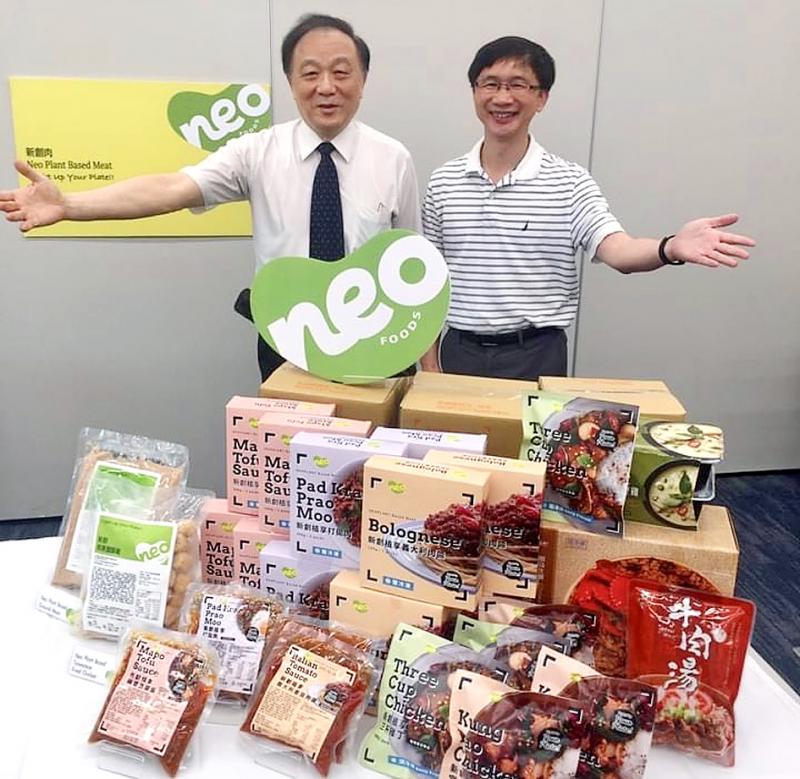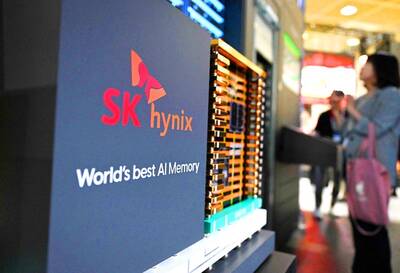Agriculture and food conglomerate DaChan Great Wall Group (大成集團) on Friday announced a NT$1 billion (US$36.1 million) investment in the development of a “neo foods” line of plant-based meat substitutes, seeking to increase its share in the rapidly expanding meat alternative market.
DaChan said it would set up a production facility in Taoyuan’s Yangmei District (楊梅), with production to start in two to three years.
The maximum annual output of the plant would be worth NT$2 billion, the firm said.

Photo courtesy of DaChan Great Wall Group
DaChan subsidiary Neo Foods Co (新食成) produces plant-based meat alternatives such as “chicken nuggets” and “burgers,” as well as mapo tofu or kung pao chicken, at its facilities in Taoyuan’s Jhongli District (中壢) and Tainan’s Yongkang District (永康).
About 13 percent of Taiwanese are vegetarians, DaChan chairman Charles Han (韓家宇) said, adding that he does not see Neo Foods’ market limited to that demographic.
Plant-based meat alternatives are a “new protein choice” for everyone, he said.
“Our neo meats have just as much protein as real meat and less additives compared with traditional meat substitutes,” Han said. “It tastes almost like meat. It is even more delicious and nutritious, and comes at an affordable price.”
DaChan’s neo meats are available on its Web site and on local e-commerce platforms, it said.
They would soon become available at convenience stores and restaurant chains, DaChan said.
The company said it expects rapid growth in the international meat substitute market.
Its plant-based products would debut at US supermarkets later this month, while an expansion to Europe and the Middle East is planned, DaChan said.
“DaChan will not miss out on the plant-based meat market,” DaChan vice president Dennis Han (韓家寅) said. “If we don’t do it, somebody else will.”

Intel Corp chief executive officer Lip-Bu Tan (陳立武) is expected to meet with Taiwanese suppliers next month in conjunction with the opening of the Computex Taipei trade show, supply chain sources said on Monday. The visit, the first for Tan to Taiwan since assuming his new post last month, would be aimed at enhancing Intel’s ties with suppliers in Taiwan as he attempts to help turn around the struggling US chipmaker, the sources said. Tan is to hold a banquet to celebrate Intel’s 40-year presence in Taiwan before Computex opens on May 20 and invite dozens of Taiwanese suppliers to exchange views

Application-specific integrated circuit designer Faraday Technology Corp (智原) yesterday said that although revenue this quarter would decline 30 percent from last quarter, it retained its full-year forecast of revenue growth of 100 percent. The company attributed the quarterly drop to a slowdown in customers’ production of chips using Faraday’s advanced packaging technology. The company is still confident about its revenue growth this year, given its strong “design-win” — or the projects it won to help customers design their chips, Faraday president Steve Wang (王國雍) told an online earnings conference. “The design-win this year is better than we expected. We believe we will win

Power supply and electronic components maker Delta Electronics Inc (台達電) yesterday said it plans to ship its new 1 megawatt charging systems for electric trucks and buses in the first half of next year at the earliest. The new charging piles, which deliver up to 1 megawatt of charging power, are designed for heavy-duty electric vehicles, and support a maximum current of 1,500 amperes and output of 1,250 volts, Delta said in a news release. “If everything goes smoothly, we could begin shipping those new charging systems as early as in the first half of next year,” a company official said. The new

SK Hynix Inc warned of increased volatility in the second half of this year despite resilient demand for artificial intelligence (AI) memory chips from big tech providers, reflecting the uncertainty surrounding US tariffs. The company reported a better-than-projected 158 percent jump in March-quarter operating income, propelled in part by stockpiling ahead of US President Donald Trump’s tariffs. SK Hynix stuck with a forecast for a doubling in demand for the high-bandwidth memory (HBM) essential to Nvidia Corp’s AI accelerators, which in turn drive giant data centers built by the likes of Microsoft Corp and Amazon.com Inc. That SK Hynix is maintaining its